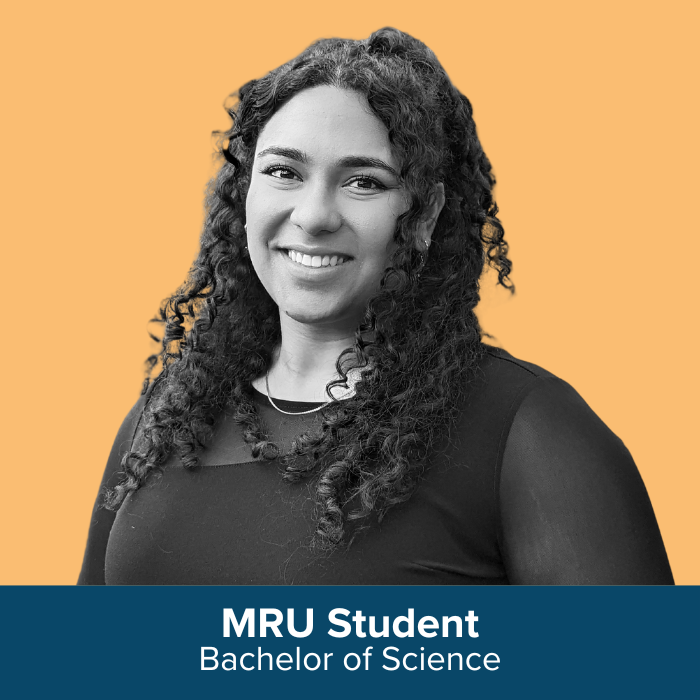Manveet Waraich - Changemaker Profile
Manveet Waraich (she/her) is Mount Royal University Student in the Faculty of Science and Technology. As a student at MRU, she co-lead the Student Changemaker Network, a student-run club focused on changemaking and the United Nations' Sustainable Development Goals.

Could you tell me about yourself?
I'm the first-generation eldest daughter of an immigrant family and I have two younger sisters. [My family] is from Punjab, so we're Sikh. In terms of other experiences that define who I am and what I do, I've been really focused on student advocacy, engagement, and policies since I was a kid. Between grade 4 until grade 12, I've always been in student unions in different positions. Since starting my degree, I've gravitated towards understanding barriers, systems and structures of everything and anything. As a result, I have founded two student organizations. The first being Women in Science and Tech, which has continued to be successful and I'm happy to have been a part of the beginning of that. The second being the Student Changemaker Network. [In creating these organizations] I saw many opportunities to make student lives better or to address the many inequalities I saw.
Going back to my identity of being Sikh, there are three principles of Sikhism that I carry with me in everything I do. The first being Kirat Karo (ਕਿਰਤ ਕਰੋ), which is to work hard and live an honest and moral life. The second being Vand Chhako (ਵੰਡ ਛਕੋ), which is whatever you're doing should be shared among the community and the public. The third is Naam Japna, [for me] to be Sikh means that we are here to serve the people around us to make this world a better place in whatever capacity we can and to stand up for those that are less privileged.
What does it mean to be a changemaker?
A changemaker is being an active participant in the world. A changemaker recognizes that as an individual and in a collective, they have the ability to change systems to benefit [the greater good]. Changemakers make change in a way that is recognizant of lived experience and is rooted in humble, non-egoistic thinking. We don't want those band-aid solutions [we need to address] what the root causes of a problem are.
Anyone can be a changemaker. I had this mission to help students understand that in whatever degree that they're in, they can have a socially impactful career. Whatever passions [students have] they can make it purposeful. Being a changemaker is to recognize your [passions and power] and to stand up for what's right.
What big, beautiful question drives your work?
The big, beautiful question that drives my work is - “What are we?” This is going to be so ethereal in a way, but [I ask] “What are we here for on this earth?” When I connect that question to what I do, I let go of those shallow inclinations and influences and come back to people, connections, and being purposeful and making the hard choices.
How do you embody changemaking in your work?
I embody changemaking in my work by applying an innovative lens to everything that I do. [I am] able to recognize whether something is fair or not. [When I see injustice] my mind will go to: Who can I talk to that would make a decision that would change this? Who is this impacting and is it in a big way or not? Is there funding pools that I can access [to address the problem]?
When it came to finding funders for the projects that we were doing at the Changemaker Network, being able to navigate those networks and align our missions with people that would support us and also being flexible I think is a huge part of [success]. I do find that I really enjoy navigating these [challenges and networks] in a social entrepreneurial way.
How do you see changemaking happening at MRU?
I think that there's definitely strong spaces of value and changemaking [at places at MRU like] the Institute for Community Prosperity, Trico Changemakers Studio, and the Institute for Innovation and Entrepreneurship. [These spaces] definitely support innovation and students stepping out of the norm and understand how to support them [in this process]. Any student that wants to be a changemaker, or wants to get into the world of changemaking, has a lot of options to look into whether that's with programs or talking to the people that are in the [changemaking space] space. Everyone [at these Institutes] is really driven by a great foundation of values, inclusivity, and empathy. I do feel like students have less barriers to being introduced to changemaking. [An important factor] is that these institutes provide students with funding when they do their programs, which really breaks that cycle of privilege
Where do you find points of inspiration?
[This experience] has been a collection of little things, good and bad, that has driven towards changemaking. I did [see myself] as an individual with a drive towards changemaking, I just didn't know it was called changemaking that time. [While at MRU, I discovered] there was a whole accredited program for social innovation [It was great] getting connected to the formal side of changemaking at the university and feel that I can have a career that is stable and advances [social causes].

